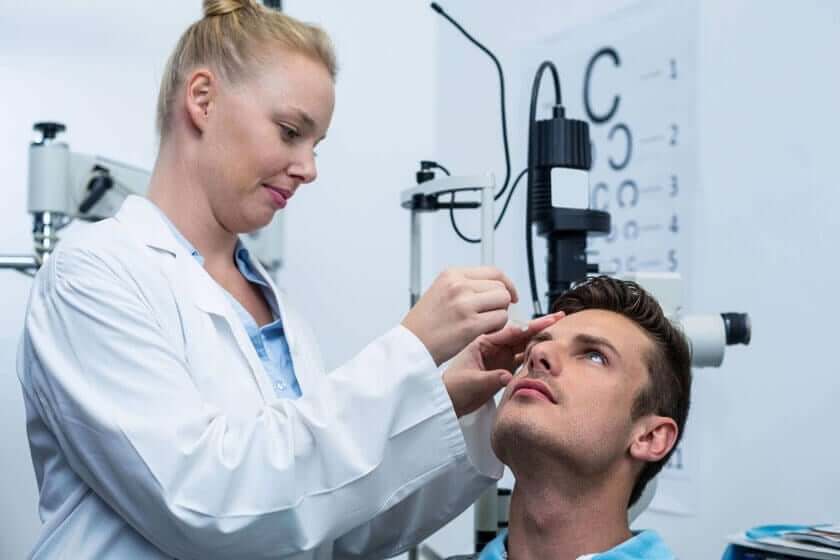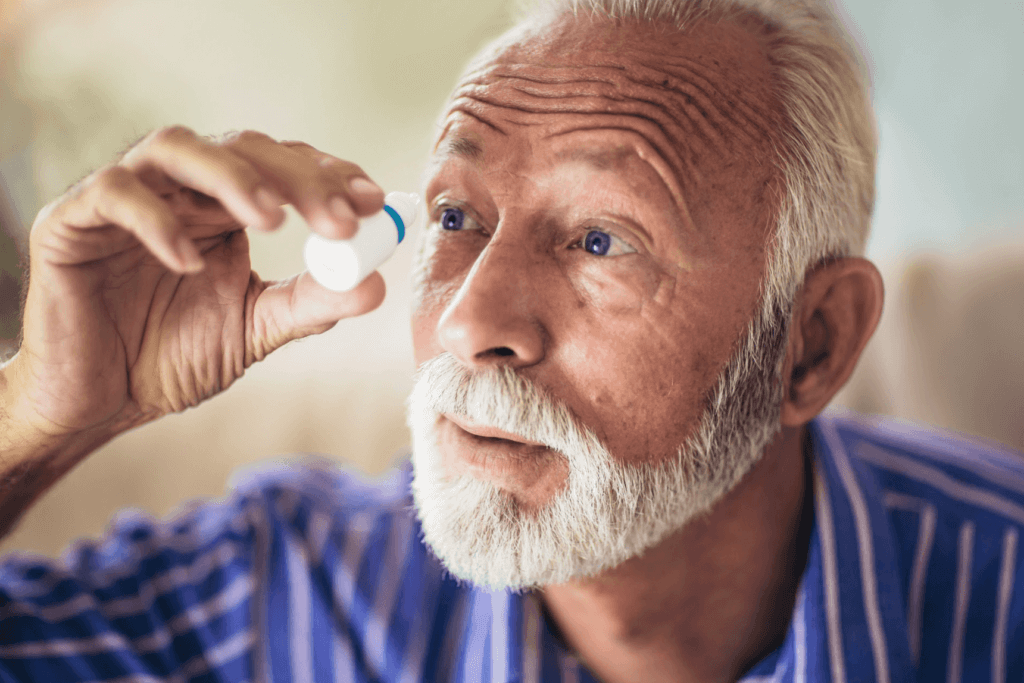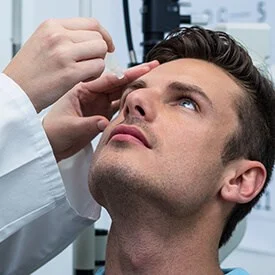Dry Eye Syndrome in Boca Raton, FL
What Is Dry Eye Syndrome?
Most individuals will occasionally deal with dry, irritated eyes, but chronic or repeated symptoms could be dry eye syndrome. This common condition is the result of either a lack of tears or unbalanced tear components, which in turn could be caused by medical conditions, various medications, or lifestyle factors. Tears are fundamental to the overall health of the eyes, and when they are not present, it can lead to extreme discomfort and even blurry eyesight. The experienced ophthalmologists at Clewner & Kelly Eye Center offer a number of treatments for patients suffering from dry eye syndrome. Contact our Boca Raton, FL practice to schedule a consultation, and explore your options.
What are symptoms of dry eye syndrome?
Dry eye syndrome can cause a variety of uncomfortable and disruptive symptoms. Recognizing these symptoms early is crucial for managing the condition effectively. Common signs of dry eye syndrome include:
- Blurry or hazy vision
- Stinging and burning
- Eye redness
- Light sensitivity
- The feeling of having something in your eye
- Overly watery eyes as a response to dryness
- Mucus around the eye that appears stringy
If you are experiencing these symptoms on a chronic basis, then it is important to seek help from a dry eye specialist in Boca Raton, FL.
What Causes Dry Eye Syndrome?
There are several factors that could cause dry eyes. The primary factor, however, is simply aging. As we age, tear production decreases; this leads to dry tear ducts. Other factors that could cause dry eyes include:
- A dry environment
- Eye allergies
- Contacts
- Hormonal changes (such as those experienced during pregnancy or after menopause)
- Medications (tranquilizers, birth control, heart medications)
- Illness
- Bad blinking habits
- Previous laser eye surgery
- Looking at the computer for long periods of time
- Certain conditions (such as diabetes or Sjogren’s syndrome)
What Are the Risk Factors Associated With Dry Eye Syndrome?
Dry eye syndrome has several risk factors predisposing individuals to develop this uncomfortable condition. Age is a significant risk factor, as tear production decreases as people age. Hormonal changes, particularly during pregnancy or menopause, can also contribute to dry eye syndrome. Additionally, underlying health conditions such as diabetes or autoimmune diseases like Sjogren’s syndrome can increase the likelihood of developing dry eyes. Certain medications, including antihistamines, antidepressants, and blood pressure drugs, can also lead to a higher risk of dry eye syndrome.
How Is Dry Eye Diagnosed?
Dry eye syndrome is diagnosed during a comprehensive eye exam. During this visit, we will discuss your symptoms in detail and review your medical history to identify potential contributing factors. A variety of diagnostic tests may be performed, such as measuring tear production with the Schirmer test, evaluating the quality and stability of your tears, and examining your eyelids and corneal surface for signs of dryness or inflammation. If a diagnosis of dry eye syndrome is confirmed, we will work with you to create a personalized treatment plan tailored to your specific needs and lifestyle, ensuring optimal comfort and improved eye health.
How is dry eye syndrome treated?
Your best treatment for dry eye syndrome will depend on the underlying reason behind your dry eyes. Following an in-depth exam and consultation, our team can decide which treatment best suits your specific needs. Many patients with minor cases of dry eye can reduce their symptoms with prescription or nonprescription artificial tears. If your condition is more complicated, such as you have blocked tear ducts, there are several procedures available for addressing the different underlying causes of dry eye. If your dry eye is caused by meibomian gland dysfunction (MGD), where the glands in the eyelids have become obstructed, our office offers LipiFlow® to unblock meibomian glands and increase the production of lubrication oils for increased tears.
What can I expect with Lipiflow?
LipiFlow is an innovative FDA-cleared device designed to deliver therapeutic energies to the meibomian glands without interfering with the eye’s fragile structures. To begin your procedure, our LipiFlow specialists will numb your eyes with anesthetic eye drops and place the LipiFlow activators over your eyes. The activators will use a combination of heat and gentle pressure to safely eliminate gland obstructions. The procedure takes a total of 12 minutes, and when the activators are removed, you will be able to return to your regular routine. Following the procedure, normal gland function recovers, and you can expect maximum improvement in eye lubrication over a period of 6 – 8 weeks.
Dry Eye Syndrome FAQ
Does drinking more water help alleviate dry eyes?
Drinking enough water is imperative for your overall health; however, it can help with your eye health as well. Drinking enough water throughout the day can help keep your eyes moist.
Is there a cure for dry eye syndrome?
While there is not a known cure for dry eye syndrome, several methods of treatment to alleviate symptoms and preserve ocular health have proven effective. Depending on the cause of your dry eye syndrome, you may be able to benefit from advanced treatments like LipiFlow in Boca Raton, FL.
Can dry eye syndrome cause vision loss?
Dry eye syndrome can lead to complications such as eye infections, which may damage your delicate eye structures. In rare cases, when left untreated, dry eye syndrome can lead to vision loss. It is important that you consult an eye specialist in Boca Raton, FL when you notice symptoms so that your vision and quality of life can be preserved.
Can using a humidifier help with dry eye symptoms?
Yes, using a humidifier can help alleviate dry eye symptoms, especially in environments with low humidity, such as heated or air-conditioned spaces. A humidifier adds moisture to the air, which can reduce the rate of tear evaporation and help keep your eyes more comfortable. This can be particularly helpful during the winter months or in dry climates.
Can certain medications worsen dry eye symptoms?
Yes, some medications can contribute to or worsen dry eye symptoms. Common culprits include antihistamines, decongestants, certain blood pressure medications, and antidepressants, which can reduce tear production. If you’re experiencing dry eyes and are on medication, consult with your eye care specialist. They can help identify potential medication-related causes and suggest adjustments or alternative treatments to alleviate symptoms.
How does screen time affect dry eye syndrome?
Prolonged screen time can worsen dry eye symptoms due to decreased blink rates, which can lead to tear evaporation. When using digital devices, remember to take regular breaks, follow the 20-20-20 rule (looking at something 20 feet away for 20 seconds every 20 minutes), and consciously blink to keep your eyes moist. If you experience discomfort, your eye care provider can recommend additional strategies to manage symptoms related to screen use.
Relieve Your Dry Eye Today
Having dry eye syndrome is more than just painful. It can also result in reduced vision if left untreated. If you are experiencing dry eye symptoms and have been unable to get relief from over-the-counter solutions, plan a dry eye exam at our Boca Raton, FL facility. Our wonderful team at Clewner & Kelly Eye Center can diagnose and reverse your dry eye syndrome.
Related Posts
How Can You Treat and Prevent Dry Eye Syndrome?
*Individual results are not guaranteed and may vary from person to person. Images may contain models.



